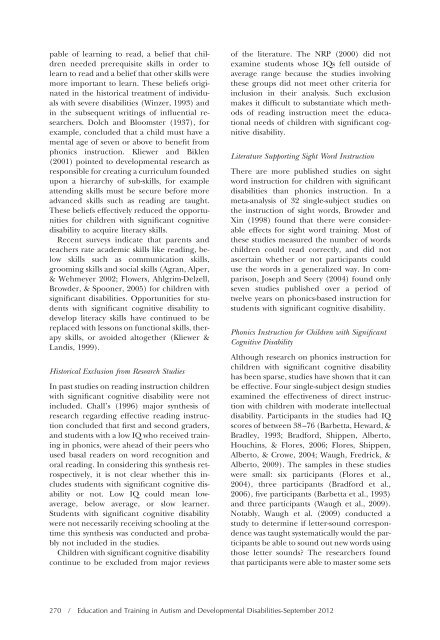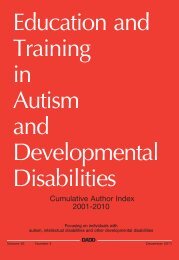etadd_47(3) - Division on Autism and Developmental Disabilities
etadd_47(3) - Division on Autism and Developmental Disabilities
etadd_47(3) - Division on Autism and Developmental Disabilities
Create successful ePaper yourself
Turn your PDF publications into a flip-book with our unique Google optimized e-Paper software.
pable of learning to read, a belief that children<br />
needed prerequisite skills in order to<br />
learn to read <strong>and</strong> a belief that other skills were<br />
more important to learn. These beliefs originated<br />
in the historical treatment of individuals<br />
with severe disabilities (Winzer, 1993) <strong>and</strong><br />
in the subsequent writings of influential researchers.<br />
Dolch <strong>and</strong> Bloomster (1937), for<br />
example, c<strong>on</strong>cluded that a child must have a<br />
mental age of seven or above to benefit from<br />
ph<strong>on</strong>ics instructi<strong>on</strong>. Kliewer <strong>and</strong> Biklen<br />
(2001) pointed to developmental research as<br />
resp<strong>on</strong>sible for creating a curriculum founded<br />
up<strong>on</strong> a hierarchy of sub-skills, for example<br />
attending skills must be secure before more<br />
advanced skills such as reading are taught.<br />
These beliefs effectively reduced the opportunities<br />
for children with significant cognitive<br />
disability to acquire literacy skills.<br />
Recent surveys indicate that parents <strong>and</strong><br />
teachers rate academic skills like reading, below<br />
skills such as communicati<strong>on</strong> skills,<br />
grooming skills <strong>and</strong> social skills (Agran, Alper,<br />
& Wehmeyer 2002; Flowers, Ahlgrim-Delzell,<br />
Browder, & Spo<strong>on</strong>er, 2005) for children with<br />
significant disabilities. Opportunities for students<br />
with significant cognitive disability to<br />
develop literacy skills have c<strong>on</strong>tinued to be<br />
replaced with less<strong>on</strong>s <strong>on</strong> functi<strong>on</strong>al skills, therapy<br />
skills, or avoided altogether (Kliewer &<br />
L<strong>and</strong>is, 1999).<br />
Historical Exclusi<strong>on</strong> from Research Studies<br />
In past studies <strong>on</strong> reading instructi<strong>on</strong> children<br />
with significant cognitive disability were not<br />
included. Chall’s (1996) major synthesis of<br />
research regarding effective reading instructi<strong>on</strong><br />
c<strong>on</strong>cluded that first <strong>and</strong> sec<strong>on</strong>d graders,<br />
<strong>and</strong> students with a low IQ who received training<br />
in ph<strong>on</strong>ics, were ahead of their peers who<br />
used basal readers <strong>on</strong> word recogniti<strong>on</strong> <strong>and</strong><br />
oral reading. In c<strong>on</strong>sidering this synthesis retrospectively,<br />
it is not clear whether this includes<br />
students with significant cognitive disability<br />
or not. Low IQ could mean lowaverage,<br />
below average, or slow learner.<br />
Students with significant cognitive disability<br />
were not necessarily receiving schooling at the<br />
time this synthesis was c<strong>on</strong>ducted <strong>and</strong> probably<br />
not included in the studies.<br />
Children with significant cognitive disability<br />
c<strong>on</strong>tinue to be excluded from major reviews<br />
of the literature. The NRP (2000) did not<br />
examine students whose IQs fell outside of<br />
average range because the studies involving<br />
these groups did not meet other criteria for<br />
inclusi<strong>on</strong> in their analysis. Such exclusi<strong>on</strong><br />
makes it difficult to substantiate which methods<br />
of reading instructi<strong>on</strong> meet the educati<strong>on</strong>al<br />
needs of children with significant cognitive<br />
disability.<br />
Literature Supporting Sight Word Instructi<strong>on</strong><br />
There are more published studies <strong>on</strong> sight<br />
word instructi<strong>on</strong> for children with significant<br />
disabilities than ph<strong>on</strong>ics instructi<strong>on</strong>. In a<br />
meta-analysis of 32 single-subject studies <strong>on</strong><br />
the instructi<strong>on</strong> of sight words, Browder <strong>and</strong><br />
Xin (1998) found that there were c<strong>on</strong>siderable<br />
effects for sight word training. Most of<br />
these studies measured the number of words<br />
children could read correctly, <strong>and</strong> did not<br />
ascertain whether or not participants could<br />
use the words in a generalized way. In comparis<strong>on</strong>,<br />
Joseph <strong>and</strong> Seery (2004) found <strong>on</strong>ly<br />
seven studies published over a period of<br />
twelve years <strong>on</strong> ph<strong>on</strong>ics-based instructi<strong>on</strong> for<br />
students with significant cognitive disability.<br />
Ph<strong>on</strong>ics Instructi<strong>on</strong> for Children with Significant<br />
Cognitive Disability<br />
Although research <strong>on</strong> ph<strong>on</strong>ics instructi<strong>on</strong> for<br />
children with significant cognitive disability<br />
has been sparse, studies have shown that it can<br />
be effective. Four single-subject design studies<br />
examined the effectiveness of direct instructi<strong>on</strong><br />
with children with moderate intellectual<br />
disability. Participants in the studies had IQ<br />
scores of between 38–76 (Barbetta, Heward, &<br />
Bradley, 1993; Bradford, Shippen, Alberto,<br />
Houchins, & Flores, 2006; Flores, Shippen,<br />
Alberto, & Crowe, 2004; Waugh, Fredrick, &<br />
Alberto, 2009). The samples in these studies<br />
were small: six participants (Flores et al.,<br />
2004), three participants (Bradford et al.,<br />
2006), five participants (Barbetta et al., 1993)<br />
<strong>and</strong> three participants (Waugh et al., 2009).<br />
Notably, Waugh et al. (2009) c<strong>on</strong>ducted a<br />
study to determine if letter-sound corresp<strong>on</strong>dence<br />
was taught systematically would the participants<br />
be able to sound out new words using<br />
those letter sounds? The researchers found<br />
that participants were able to master some sets<br />
270 / Educati<strong>on</strong> <strong>and</strong> Training in <strong>Autism</strong> <strong>and</strong> <strong>Developmental</strong> <strong>Disabilities</strong>-September 2012

















